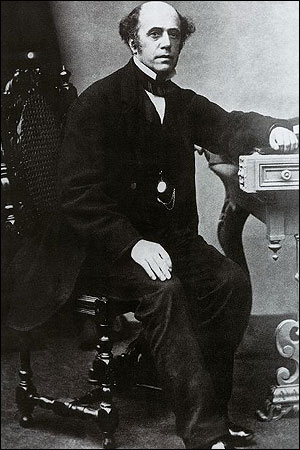5 reasons for the failure of Thomas Cook, the world’s first travel agency
Table of Contents
Founded in 1845, Thomas Cook is the world’s first travel agency. A few years ago, the company was one of the world’s leading leisure travel providers operating in 17 countries, owning a fleet of aircraft and operating thousands of hotels around the world.
In 2019, the world watched its longest-running travel agency admit failure.
Let’s start from the beginning.
Thomas Cook – a short timeline
1845
Thomas Cook is an English businessman, who worked as a gardener and cabinet maker. He arranges for a party to travel from his hometown Leicester to Liverpool by train. Thus the world’s first travel agency is born. In 1846, he takes 350 people from Leicester on a tour of Scotland. A few years later he arranges for 150,000 people to travel to the Great Exhibition in London.

1855
In 1855, he plans his first continental tour, taking two groups on a grand tour of Belgium, Germany and France. The agency offers a complete package with its price including travel, accommodation and food, the first-ever of its kind.
1865-1866
The agency opens its first high-street shop in London. In 2019, the year of the collapse, the agency owns about 560 travel stores in the UK.
Thomas Cook’s son, John Mason personally conducts the company’s first American tour.
1872
Thomas Cook organizes the world’s first round-the-world tour. In the years to come, the company plans various tours to far-flung locations all over the world, including safaris in Africa. The company also expands into air and sea tours.
1965
The company’s net profits exceed £1 million for the first time.
1995
Launches thomascook.com, the first UK retail travel agency to offer customers a way to buy holidays online.
2000-2018
The company makes a series of acquisitions and mergers to extend its market share. The downside: acquiring a large debt.
2019
Royal Bank of Scotland, one of the company’s funders and a range of other banks demand that Thomas Cook Group PLC find $250 million in funding to ensure operations were protected.
The company’s management turned to the UK government for financial rescue. The UK government rejected its request.
Peter Fankhauser, Thomas Cook’s CEO, apologized to customers, employees, suppliers and partners and said the company “had no choice but to take steps to enter into compulsory liquidation with immediate effect” after talks on a financial rescue failed.” “This marks a deeply sad day for the company which pioneered package holidays and made travel possible for millions of people around the world.”
The group’s operations ceased immediately leaving around 600,000 tourists overseas including 150,000 British citizens.
It was the UK’s biggest peacetime repatriation.
Here’s another example: 4 reasons why fashion retailer Forever 21 went bust.
Thomas Cook – The scale of its collapse
Before entering into compulsory liquidation in 2019, here is an overview of Thomas Cook’s business:
- Thomas Cook Airlines owned a fleet of 93 aircrafts.
- The company employed approximately 21,000 staff worldwide, with 9,000 in the U.K.
- The agency offered its services in 17 countries either through its own branches or brand partners.
- Thomas Cook Group operated 3,170 hotels across 47 destinations.
- The group was the 2nd largest travel agency in Europe.
- Made EUR 9.5B in sales in 2018.
- Served 20 million customers every year.
- The company offered seven travel-related services: flights, hotel accommodation, cruises, foreign exchange, travel insurance, holiday packages, and one-stop shops, essentially meeting every need of its customers, from A to Z, with in-house resources.
Brand values: “Thomas Cook‘s promise to its customers is to be personal, trusted and innovative, placing them at the heart of everything it does.”
The downfall of Toys R Us – don’t blame Amazon!
5 reasons for Thomas Cook’s failure
- Late to change its business model;
- Failed to cut costs;
- Missed the opportunity to include Millennials among its customers;
- Didn’t come up with solutions to mitigate the consequences of Brexit;
- Acquired $2 billion in debt.
Late to change its business model
In 2017, Thomas Cook travel agents were still selling travel packages in high-street stores, while online sales in the UK were growing by as much as 30%.
The stores were in great locations and contributed to the company’s effort to maintain brand awareness. But the renting costs were high.
Thomas Cook began closing some of its physical stores and changed its strategy to an online platform. But it was too little too late and the online solution presented its own challenges apart from job losses which were significant. How to maintain online customer service at the same level as it was in physical stores when customers were talking to a person?
Failed to cut costs
In addition to cutting rental costs, the agency was struggling with the high costs of running an airline.
The airline industry is, in general, a highly competitive, low-profit margin industry. The customers are price sensitive and the internet environment allowed them to compare prices and go with the lowest. It is worth mentioning that most of Thomas Cook’s competitors did not operate flights directly.
Missed the opportunity to include the Millennials among its customers
With a new generation of travellers entering the market, the industry was bound to change. Millennials are different from their parents and their grandparents in terms of how they like to travel.
A 2016 survey revealed that Millennials would rather take more short trips – at least seven – throughout the year rather than one vacation package. That’s why city breaks became in high demand among this generation and the travel services providers had to adapt to this new way of travelling.
Also, Millennials behaved differently in that they planned their own itineraries, used digital tools (like Airbnb or Booking.com), focused on transformational experiences and were influenced by social media or user-generated content (source).
Thomas Cook failed to adapt to this new type of customer and as a result, its sales were going down.
Didn’t come up with solutions to mitigate the consequences of Brexit
The UK was set to leave the EU and that caused high levels of uncertainty and anxiety among the British people.
With neither the government nor the media shedding light on the issues at hand, the agency’s customers in the UK decided to postpone their holidays.
Brexit affected Thomas Cook negatively, especially since the agency didn’t come up with a solution to this situation.
Acquired large debt over the years
Over the years, following many acquisitions and mergers, the company acquired a $2 billion debt which it wasn’t able to solve.
The problems related to the company’s debt began to be relevant around 2010. The company’s growth was not possible without external financing.
Conclusion
In the span of 174 years, pioneer Thomas Cook had become one of the leading companies in the travel industry.
I believe two aspects of its collapse could have been prevented.
What happened was, as usually is the case with legacy brands, the company failed to adapt to technology and customer behaviour change.
In business, early adopters of the latest technologies turn the threat into an opportunity. Thomas Cook was a late adopter. Their customers shifted to online services before they did which resulted in the company losing the advantage and momentum. This is ironic, since Thomas Cook, the company’s founder started the agency by leveraging a new piece of technology which had just been introduced in the US, in the early 1800s: rail transportation. Read another example of a global brand that went bankrupt.
They also failed to keep a close eye on their customer’s buying behaviour and profile. A new generation was looking to travel, a new type of customer very much different from their customer base had entered the travel market and they were blind to the change. Customer behaviour analysis should be conducted periodically, not when sales are down. Understanding the psychological profile of our customers is essential.
How the UK marketers feel towards the GDPR
Only 11% of marketers already have systems in place to ensure they don’t fall foul of the legislation, as shows data from YouGov and The Chartered Institute of Marketing (CIM). From May 2018, the EU General Data Protection Regulation (GDPR) will come into effect. The reform is one of the most significant in years at 200-pages long and formalizes concepts like the ‘right to be forgotten’, data breach accountability, data portability and more. Huge fines of €20m, or up to 4% of global revenues, have been threatened for non-compliance.
The study into the challenges and opportunities facing those in the industry was based on two separate surveys from YouGov and the CIM. Key findings from the former, which surveyed 225 marketers found that for those in the UK, Brexit (55%) and a recession (47%) were the top concerns for the year ahead. Only 13% of those quizzed said that GDPR would be a significant cause of worry, with just 31% admitting they do not know whether their business has taken steps to ensure they’re compliant.

source: The Chartered Institute of Marketing (CIM)
The CIM’s dataset from 112 members revealed that 70% of marketers are concerned about factors outside of their control, including data breaches, impacting on their brand. The introduction of GDPR will have huge ramifications for marketers who handle personal data and also place demands on businesses to demonstrate informed consent to use consumers’ personal data for marketing purposes – something marketers have previously expressed anxiety over.
Chris Daly, chief executive of the CIM said that while marketers were conscious of impending challenges like Brexit and other digital trends, they have to make sure it doesn’t obscure other issues.
“It is concerning to see that GDPR has not been fully considered, given the wide-reaching impact this will have on business areas which deal with data – marketers’ natural habitat. Given the concerns that emerged from consumers last year over how businesses collect and use customer data, marketers must make sure they are prepared and ready for GDPR sooner rather than later. By staying on the right side of the incoming legislation, marketers are best placed to safeguard not only their business’ reputation, but also its finances.”
The report, “The Challenges and Opportunities facing Marketers in 2017”, features the results of a YouGov survey of 255 marketers, in which more than half (55%) said the UK’s exit from the European Union was among their top concerns.
As a result of the UK’s looming constitutional changes, 54% of marketers said they expected to see an increase in “Brand Britain” messaging, and 19% said they were already looking at how to incorporate this into their own marketing.
Further data from a survey of 112 CIM members, conducted via Survey Monkey, reveals that:
- 70% of marketers are concerned about factors outside of their control (data breach, tax scandals, workers’ rights problems) impacting on the brand
- 95% think marketers need more influence and involvement with the broader business in order to protect brand reputation
Despite the influence social media gives consumers, only 18% of marketers are confident they can handle anything social media throws at them.
One of the key drivers for this is the impact of social media, which gives consumers a platform to shine a light on bad brand behaviour – in fact, 89% of marketers believe the Internet, and social media in particular, gives consumers more power to effect change over brands. However, 21% of marketers feel that while they can manage social media daily, they would struggle in the midst of a Twitter storm. Half of marketers (49%) also say they are not getting the most out of their social media, with 22% attributing this to a lack of investment. While marketers are trying to keep up with changing customer expectations, it would seem some are being held back by the business.
